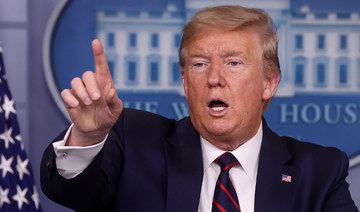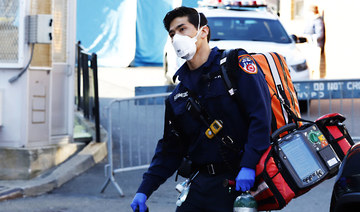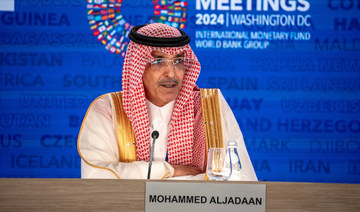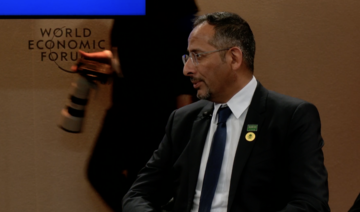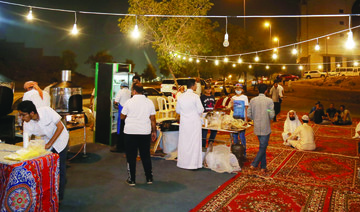WASHINGTON: President Donald Trump signed an unprecedented $2.2 trillion economic rescue package into law Friday, after swift and near-unanimous action by Congress to support businesses, rush resources to overburdened health care providers and help struggling families during the deepening coronavirus epidemic.
Acting with unity and resolve unseen since the 9/11 attacks, Washington moved urgently to stem an economic free fall caused by widespread restrictions meant to slow the spread of the virus that have shuttered schools, closed businesses and brought American life in many places to a virtual standstill.
“This will deliver urgently needed relief,” Trump said as he signed the bill in the Oval Office, flanked only by Republican lawmakers. He thanked members of both parties for putting Americans “first.”
Earlier Friday, the House gave near-unanimous approval by voice vote after an impassioned session conducted along the social distancing guidelines imposed by the crisis. Many lawmakers sped to Washington to participate — their numbers swollen after a maverick Republican signaled he’d try to force a roll call vote — though dozens of others remained safely in their home districts.
The Senate passed the bill unanimously late Wednesday.
“Today we’ve all acknowledged our nation faces an economic and health emergency of historic proportions,” said House Speaker Nancy Pelosi, D-Calif. She said Americans deserve a full-on government response “to address these threats to their lives and their livelihood and they need it now.”
The $2.2 trillion legislation will speed government payments of $1,200 to most Americans and increase jobless benefits for millions of people thrown out of work. Businesses big and small will get loans, grants and tax breaks. It will send unprecedented billions to states and local governments, and the nation’s all but overwhelmed health care system.
“This is not a time for cynicism or invective or second-guessing,” said GOP Whip Liz Cheney of Wyoming. “This is a time to remember that we are citizens of the greatest nation on Earth, that we have overcome every challenge we have faced, and we will overcome this one.”
Despite reservations, arch conservatives joined with progressives like Alexandria Ocasio-Cortez, D-N.Y., to back the bill, which moved quickly through a Congress that’s been battered by partisanship and is itself not immune to the suffering the virus has caused. Reps. Joe Cunningham, D-S.C., and Mike Kelly, R-Pennsylvania, announced Friday that they’d tested positive, bringing the number of infected lawmakers to five.
Tea party Republicans said government orders to shutter businesses merited actions that conflict with their small-government ideology. Liberals accepted generous corporate rescues that accompany larger unemployment benefits, deferrals of student loans, and an enormous surge of funding for health care and other agencies responding to the crisis.
“I’m going to have to vote for something that has things in it that break my heart,” said conservative Rep. David Schweikert, R-Arizona
The bipartisan amity went only so far. Top congressional Democrats were not invited to the White House signing ceremony, said Democratic aides speaking on condition of anonymity to describe the situation.
Many lawmakers summoned the bipartisan spirit of 9/11 and efforts to fight terrorism. Others praised the roles low-income workers play in keeping the country going and the heroism of health care workers. Some, like Iowa Democrat Abby Finkenauer, who had just learned of two additional coronavirus-related deaths in her district, came close to tears.
Others couldn’t restrain their partisan impulses. Republicans chided Democratic leaders for delays and provisions they see as extraneous, such as funding for public broadcasting and the arts; Democrats said too many elements are a bailout for corporations that may not need it.
Still, in a chamber increasingly populated by lawmakers whose chief skill often seems to be partisan attacks, Friday’s debate was a noteworthy break.
“We have no time to dither,” said Rep. Gerald Connolly, D-Virginia “We have no time to engage in ideological or petty partisan fights. Our country needs us as one.”
The run-up to the vote contained an element of drama because libertarian conservative Thomas Massie, R-Kentucky, announced plans to seek a roll call vote.
Leaders of both parties united to prevent that because it would have forced lawmakers back to the Capitol or blemished their voting records if they stayed home. Instead, they made sure enough lawmakers would attend Friday’s session to block Massie’s move under the rules, and lawmakers took the unprecedented step of sitting in the visitors galleries to establish the necessary quorum.
The House promptly adjourned for a weeks-long recess but will return later in the spring to consider further legislation.
“This bill is not only a rescue package, it’s a commitment — a commitment that your government, and the people whom you elected to serve you, will do everything we can to limit the harm and hardship you face, both now and in the foreseeable future,” said Minority Leader Kevin McCarthy, R-Calif.
The massive CARES Act started as a draft plan among Republicans controlling the Senate who were seeking a greater voice in the coronavirus response efforts — especially after Pelosi was a dominant force in earlier legislation imposing a sick leave mandate on businesses.
Senate Majority Leader Mitch McConnell, R-Kentucky, welcomed Democratic participation a week ago, and signed off on a major expansion of unemployment insurance, but his efforts to freeze out Pelosi and force a quick agreement were met with Democratic demands for large infusions of aid to states and hospitals, as well as an assortment of smaller items. McConnell and top Senate Democrat Chuck Schumer of New York wrestled for days, along with Treasury Secretary Steven Mnuchin and other administration officials.
Negotiations finally produced a deal early Wednesday morning, and the Senate passed the measure by a 96-0 vote.
The legislation dwarfs prior Washington responses to crises like 9/11, the 2008 financial crisis, and natural disasters.
Key elements are untested, such as grants to small businesses to keep workers on payroll and complex lending programs to larger businesses. Rebate payments will go to people who have retained their jobs. Agencies like the Small Business Administration and state unemployment systems will be severely taxed, and conservatives fear that a new, generous unemployment benefit will dissuade jobless people from returning to the workforce.
The bill amounts to a bridge loan for much of the economy and carries a price tag that equals half the size of the entire $4 trillion-plus annual federal budget.
The legislation also establishes a $454 billion program for guaranteed, subsidized loans to larger industries in hopes of leveraging up to $4.5 trillion in lending to distressed businesses, states, and municipalities.
There is also $150 billion devoted to the health care system, including $100 billion for grants to hospitals and other health care providers buckling under the strain of COVID-19 caseloads.
It also seeks to strengthen the safety net for the poor and homeless. Schools and students would get relief, small business loans payments would be deferred. Evictions from public housing would be put on pause.
Republicans successfully pressed for an employee retention tax credit designed to help companies keep workers on payroll. Companies would also be able to defer payment of the 6.2% Social Security payroll tax. A huge tax break for interest costs and operating losses limited by the 2017 tax overhaul was restored at a $200 billion cost in a boon for the real estate sector.
Most people who contract the new coronavirus have mild or moderate symptoms, such as fever and cough that clear up in two to three weeks. For some, especially older adults and people with existing health problems, it can cause more severe illness, including pneumonia, or death.
Trump signs $2.2T stimulus after swift congressional votes
https://arab.news/gskqb
Trump signs $2.2T stimulus after swift congressional votes
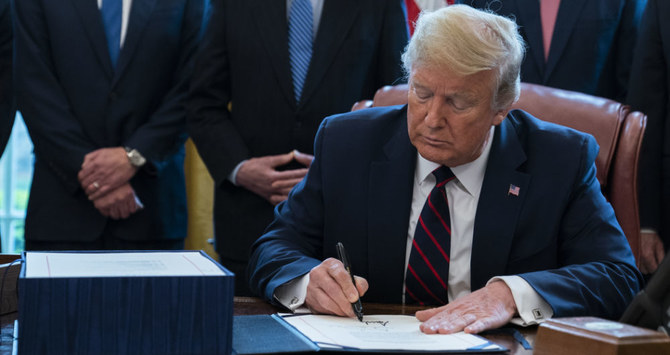
- Trump: “This will deliver urgently needed relief"
- Washington moved urgently to stem an economic free fall
IMF, World Bank steering committee stresses accountability as reforms advance
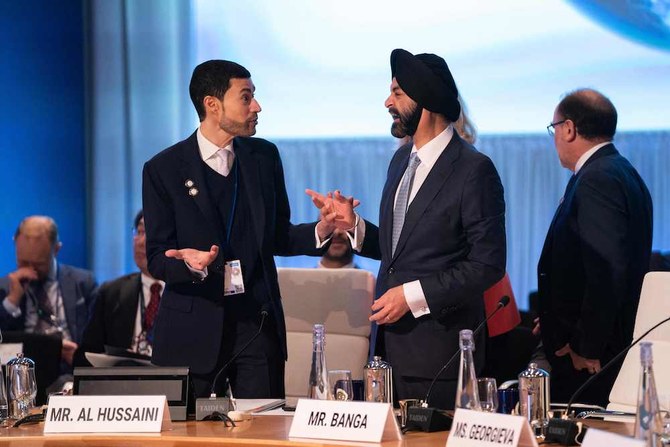
- Governors of the institutions urged the World Bank to continue to bolster global and regional partnerships
WASHINGTON DC: The steering committee for both International Monetary Fund and the World Bank on Saturday emphasized the need for broader accountability as the institutions implemented reforms to help countries grapple with climate change and other shocks.
“We must hold ourselves accountable more broadly as we become a better and bigger bank,” said Mohammed bin Hadi Al Husseini, the United Arab Emirates’ minister of state for finance, who heads the joint Development Committee this year.
Al-Husseini issued a chair’s statement, rather than a communique, amid disagreements over wars in the Middle East and Ukraine, but referenced economic risks posed by the conflicts. The statement came as this week’s meetings of the IMF and World Bank drew to a close.
Governors of the institutions urged the World Bank to continue to bolster global and regional partnerships, and asked its management to push ahead with country engagement reforms and enhanced country diagnostics.
They also encouraged further collaboration between the World Bank and IMF to help countries mobilize more revenues at home, and on issues such as climate change and pandemic preparedness, as well as debt sustainability.
Saudi chair of IMFC acknowledges impact of global crises, says they should be discussed in other forums
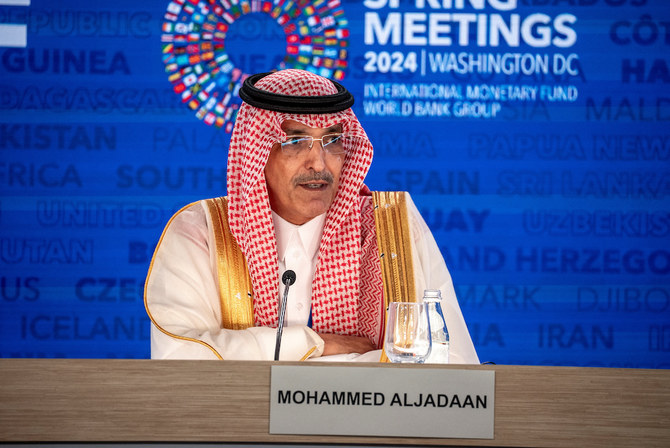
- Thanks expressed to outgoing chair Nadia Calvino for her leadership
RIYADH: The International Monetary and Financial Committee on Friday held its biannual meeting in Washington DC to discuss the global macroeconomic and financial impact of current conflicts.
The IMFC members focused on the war in Ukraine, the humanitarian crisis in Gaza, and shipping disruptions in the Red Sea, said Mohammed Al-Jadaan, the Saudi minister of finance and the body’s chair.
Al-Jadaan said IMFC members acknowledged that the crises had significant impacts on the global economy, but added that the body was not the forum to resolve geopolitical and security issues, and that they should be discussed in other forums.
He said: “The IMFC’s role is to advise and report on the supervision and management of the international monetary and financial system. This includes responses to events that may disrupt the system.
“Of course, the world and the IMF (International Monetary Fund) itself have faced multiple global disruptions over the last few years. Prospects are improving, which is very positive, but numerous challenges remain, and we need to be vigilant and ready to address them. Today’s era must not be of war and conflict.”
The Saudi minister chairs the IMFC, the policy advisory body to the IMF’s board of governors, and was speaking during the committee’s gathering at the Spring Meetings of the IMF and World Bank.
The IMFC thanked outgoing chair Nadia Calvino for her leadership and welcomed Al-Jadaan as her replacement.
Al-Jadaan said: “A soft landing for the global economy appears to be drawing closer.
“Economic activity has proved more resilient than expected in many parts of the world, though it continues to diverge across countries.”
But as ongoing conflicts continue to burden the global economy, this has led to some weak growth prospects in the medium term.
Al-Jadaan said: “Even though inflation has fallen in most regions, owing to the unwinding of supply shocks and the effects of tight monetary policy, its persistence warrants caution.
“While risks to the outlook are now broadly balanced, downside risks remain, hinging on the near-term paths for inflation and interest rates, asset prices and financial stability, fiscal policy actions, as well as geopolitical developments.”
Other pressing challenges were also affecting the global economy, such as climate change, elevated debt vulnerabilities, rising inequality, and the risk of geoeconomic fragmentation, he added.
The Saudi minister said: “Against this background, our policy priorities are to achieve price stability, strengthen fiscal sustainability, and safeguard financial stability, while promoting inclusive and sustainable growth.
“We will proceed with rebuilding fiscal buffers, carefully tailoring actions to country-specific circumstances, while protecting the most vulnerable and growth-enhancing investment.”
Al-Jadaan said central banks remained strongly committed to achieving price stability and would continue to communicate policy objectives to help limit negative spillovers.
He added: “We continue working to address data, supervisory, and regulatory gaps in the financial sector, especially nonbank financial institutions, where relevant, and stand ready to deploy macroprudential policy tools to mitigate systemic risks.”
He said the IMF stresses the importance of international cooperation to improve the resilience of the global economy and the international monetary system, adding that members will “act collectively, as appropriate, to support climate and digital transitions, including artificial intelligence, while accounting for country-specific circumstances.”
During the meeting, which was held in the presence of the IMF’s Managing Director Kristalina Georgieva, Al-Jadaan reiterated the IMF’s commitments on exchange rates, addressing excessive global imbalances, governance, and avoiding protectionist measures.
He said: “We will also continue working together to strengthen the global financial safety net, address global debt vulnerabilities (and support) vulnerable countries as they undertake reforms to tackle their vulnerabilities and address their financing needs.”
Al-Jadaan also said the IMF would continue its “critical and catalytic role in providing financial assistance to help members address their balance of payments problems and achieve economic stability and inclusive growth.”
He added that the body was looking to welcome a new 25th chair on the IMF’s Executive Board for Sub-Saharan Africa in November to improve representation and the overall balance of regional representation.
He said: “We support the IMF’s strengthened efforts to attract and develop talent to support existing and new priority areas, and to further improve staff diversity and inclusion, responding to the specific challenges identified in the FY2022-FY2023 Diversity and Inclusion Report.”
He also announced that the next IMFC 24 members’ meeting was expected to be held in October. Representatives usually meet twice a year, at the Bank-Fund Annual and Spring Meetings, to outline the proposed agenda for the IMF’s work program.
GCC countries should strengthen supply chains to ensure industrial growth: Oliver Wyman
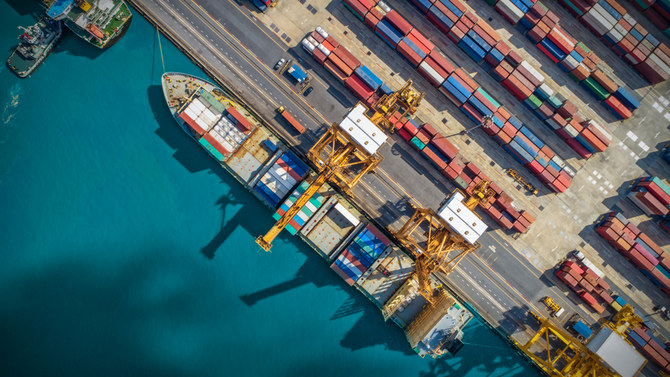
RIYADH: Countries in the Gulf Cooperation Council region should develop supply chain resilience strategies as they embark on large-scale industrialization of their economies, a report said.
According to management consulting company Oliver Wyman, current risk levels in the logistics sector need to be mitigated, especially for countries like Saudi Arabia and the UAE which depend on high-criticality products such as transformers and minerals which are crucial for industrial growth.
“In Saudi Arabia, 75 percent of transformer imports originate from only three countries. Any potential disruption in transformer supply could significantly impact several sectors such as power, manufacturing, transportation, and healthcare,” the report said.
It added that logistical issues could impact power supply, leading to decreased industrial productivity, infrastructure vulnerabilities in systems that require constant energy supply, and economic instability.
“As GCC countries scale up their economic diversification plans, including their industrial sectors, it is vital that they redouble initiatives to increase supply chain resilience to ensure the smooth functioning of all sectors and aspects of society in the event of unexpected upheavals in the supply chain,” said Frederic Ozeir, partner and head of Automotive and Manufacturing Industries, India, Middle East and Africa region at Oliver Wyman.
The vitality of supply chain resilience
Oliver Wyman noted that vulnerabilities in global supply chains came under greater scrutiny in recent years following the pandemic and numerous climate-change-induced natural disasters, in addition to cybersecurity threats, logistics challenges, and geopolitical issues.
During these years, industries across the spectrum have been forced to grapple with production delays, shortages, and an increase in prices, as well as growing demand and unexpected bottlenecks, which have highlighted the critical importance of resilient logistical chains.
“For example, of all the electrical machinery and equipment imported to both Saudi Arabia and the UAE, 60 percent and 65 percent, respectively, are imported from just three countries. Similarly, for excavation machinery and valves, Saudi Arabia and the UAE import 50 percent and 55 percent of the total from three countries,” said Oliver Wyman.
The US-based firm added that various sectors are directly dependent on the industrial supply chain, and any disruptions could have a domino effect which will amplify vulnerabilities in vital sectors that are important for health, safety, and security.
Highlighting the necessity to maintain a functional supply chain, the report noted that the healthcare industry relies on the timely delivery of medical equipment and pharmaceuticals, while the power sector hinges on a steady inflow of critical machinery and components, such as turbines, generators, and transformers.
Moreover, GCC countries are heavily reliant on desalination machinery such as membranes, pumps, and valves because desalination is the source of most of the urban water in the region.
Saudi Arabia leading the region to ensure supply chain resilience
Oliver Wyman, in its report, also lauded Saudi Arabia’s efforts to ensure a healthy logistics sector in the Kingdom, as well as the whole region.
“In 2022, KSA launched the Global Supply Chain Resilience Initiative as part of its National Investment Strategy. This aims to position the Kingdom as a location of choice for leading global industrial companies, attracting investments in supply chains in order to mitigate the impact of global disruptions,” said the report.
The study added that the UAE is also focussing on improving food supply chains through various programs such as those that support local and sustainable food production, as well as by establishing new logistics hubs and deploying cutting-edge technological solutions.
Key actions to bolster supply chain resilience in the GCC
According to the report, governments in the GCC region should develop supply chain resilience strategies that seamlessly align with their national industrialization programs.
Moreover, such strategies should be supported by a set of enablers covering governance, private sector involvement, capabilities, and technology.
Oliver Wyman also underscored the necessity of having a collaborative governance framework between different countries to strengthen the supply chain in the Middle East region.
“GCC ministries of industry and mining can work with other ministries, especially those of vital sectors to ensure supply chain resilience. As an example, a GCC Ministry of Industry that collaborates with its counterpart in the Ministry of Health would be able to better develop appropriate actions for ensuring resilience of the supply chain of medical devices,” said the report.

The report also added that GCC governments should leverage the private sector as a crucial partner in their supply chain strategies.
According to the report, countries in the region can ensure supply chain durability by incentivizing logistical resilience initiatives among the private sector, and implementing inspection and corrective actions.
Moreover, the consulting firm added that GCC countries should establish specialized teams within their ministries of industry, comprising professionals with expertise in risk assessment and management, logistics operations, data analytics, and technology to build up the logistics network.
“Various capabilities are also required across the industrial sector, such as risk assessment and management, advanced technology integration and utilization, data analytics and business continuity planning, cybersecurity, and collaboration and information sharing,” the report added.
The study highlighted that nations in the region should also encourage the adoption of technology through advanced manufacturing policies that will drive the use of 3D printing, robotics, augmented reality, and automation.
Industrial cybersecurity requirements should also be considered given the connectivity and data sharing within factories, driven by automation and the Internet of Things, the consulting firm added.
Oliver Wyman noted that GCC countries should adopt a holistic approach that combines localization with other supply chain resilience levers to safeguard the industrial growth of these nations.
“Achieving supply chain resilience in the industrial sector is not a one-size-fits-all endeavor. The levers deployed to fortify supply chains, such as localization, shoring, and partnerships, must be applied to the supply chain components of products with high criticality and risk,” Ozeir.
The study concluded that supply chain resilience is not just a choice for GCC nations, but a necessity, and one that will guarantee the sustainability of their burgeoning and all-important industrial sectors.
Future Hospitality Summit to shine spotlight on Saudi Arabia’s growing tourism industry

RIYADH: More than 1,200 investors from across the world will descend on Riyadh at the end of April for what is expected to be the biggest Future Hospitality Summit ever seen in Saudi Arabia.
The event - set to be held at Al Faisaliah Hotel from April 29 to May 1 – will focus on sustainable tourism and technology-driven hospitality under the theme, “Invest in Tomorrow: Today, Together.”
Industry leaders will discuss sustainable development, investment prospects, entrepreneurship, and human capital, as well as gain insights into the continued expansion of Saudi Arabia’s hospitality and tourism sectors.
The upcoming three-day conference, which will feature more than 150 speakers, marks the seventh industry event for the Saudi market hosted by The Bench, a British business events firm.
Jonathan Worsley, chairman of the company, said: “The objectives of FHS Saudi Arabia are strategically aligned with Vision 2030, and our carefully curated program will focus on the development and sustainable growth of the hospitality industry in Saudi Arabia, the adoption of tech, innovation, and entrepreneurship in the sector, as well as investment and job creation opportunities.”
It will emphasize strategies to foster the growth of Saudi Arabia’s hospitality sector, positioning it as a key driver of the Kingdom’s economic diversification efforts.
Additionally, it will facilitate collaboration in the tourism industry by spotlighting its potential and opportunities for partnerships.
Day 1

The first morning of the conference will be exclusively dedicated to the Global Restaurant Investment Forum, exploring Riyadh’s growing dining culture through main-stage presentations, case studies, and panel discussions.
Founded in 2015, GRIF has been a three-day conference held in Dubai and Amsterdam. This year it will be incorporated at FHS Saudi Arabia. It is mainly dedicated to investors who want to meet owners of restaurant concepts, operators and franchisors looking for growth, equity, or partners.
GRIF Culinary Tours of game-changing restaurant concepts in the culinary landscape in Saudi Arabia will take place again, as well as the Startup Den – where entrepreneurs pitch their business ideas to a panel of investor judges.
The most recent speakers who have confirmed their participation include Martin Raymond, who serves as the co-founder of the Future Laboratory and holds the position of editor-in-chief at LS:N Global. Christopher Sanderson, also a co-founder of the Future Laboratory, will be joining him.
Additionally, Mohammed Jawa, the founder and chairman of MJS Holding, Faisal Shaker, co-founder and CEO of Modern Food Company, and Nawal AlKhalawi, the founder and CEO of Asfar Experience, will address attendees.
The programme will kick off in the afternoon on April 29 with the FHS Intelligence Talks, moderated by Fritz Dickamp, managing director of Studio 49.
Topics include “The Future of Wellness – New Data on Wellness Travel,” moderated by Aradhana Khowala, CEO and founder of Aptamind Partners, in conversation with Susie Ellis, chair and CEO at Global Wellness Institute and Global Wellness Summit, and “The Hotel of the Future” presented by Turab Saleem, partner and head of Hospitality, Tourism and Leisure Advisory at Knight Frank Middle East and North Africa.
“We are offering delegates opportunities to immerse themselves in the dynamic essence of Saudi Arabia’s market. Our enriched program encompasses an array of engaging presentations, short-but-powerful ‘10X Talks’, multifaceted panel discussions, fireside chats, case studies, and captivating site tours,” Worsley said.
He added: “Furthermore, the event is peppered with ample networking opportunities over three days, all carefully curated to foster an environment of learning, dialogue, exploration, and meaningful connections.”
Day 2

On the second day, the conference will kick off with welcome remarks by Prince Bandar bin Saud bin Khalid, secretary general of the King Faisal Foundation, and chairman of the board of Al Khozama.
Plenary sessions will cover a wide range of topics including “Hospitality Investment Opportunities in Saudi Arabia in Alignment with Vision 2030” presented by Mahmoud Abdulhadi, deputy minister of Destination Enablement at the Ministry of Tourism.
A panel discussion on “A Blueprint for Successful Market Entry and Investment,” will be moderated by Edie Rodriquez, a Saudi Tourism Authority board member, with panelists Qusai Al-Fakhri, CEO of Tourism Development Fund, Fahad bin Mushayt, CEO of ASFAR, and Guy Hutchinson, president of Hilton MEA.
Also appearing will be Haitham Mattar, a special advisor to UN Tourism and managing director MEA and South West Asia at IHG Hotels & Resorts.
In addition, there will be a case study on “Public and Private Sector Collaboration to Accelerate Lifestyle Developments and Promote New Destinations,” moderated by Mohammed Islam, host and founder of the Mo Show Podcast Saudi Arabia, as well as a panel on “Maximising Financial Resilience Through Multi-asset Allocation” chaired by Matthew Martin, Saudi Arabia bureau chief at Bloomberg.
Moreover, sustainable hospitality investment and development will take center stage in the FHS program, alongside a significant emphasis on technology.
Industry leaders will delve into discussions on the future of artificial intelligence and the metaverse in hospitality, explore the convergence of AI, IT, and human interaction for enhancing guest experiences, and offer valuable insights on tech stack investment strategies for both owners and operators.
A fresh addition to FHS Saudi Arabia this year is the “Destination Tomorrow: Unveiling of Investment Opportunities” platform, designed to highlight innovative and emerging locations and attractions within the Kingdom’s hospitality and tourism sector.
Its primary goal is to facilitate connections between project developers, entrepreneurs, visionaries, investors, and other essential stakeholders.
Another inaugural event at this year’s FHS is the Speakers Corner, offering a distinctive chance for attendees to share personal narratives of overcoming challenges and achieving success in the industry.
Startup Den

The highly anticipated Startup Den returns this year, following its success at FHS Saudi Arabia 2023.
The panel of judges for this year include Prince Saud Al-Saud, executive director of TDF Grow, Salma Arafa, an innovation expert at UN Tourism, and Maya Ayoub, the founder and CEO of District Twelve and also country director of Saudi Arabia Women in Tech.
“The Bench is passionate about supporting start-ups and providing an opportunity for entrepreneurs to pitch their business to an expert panel of judges and investors,” Worsely said, adding: “This year, 10 finalists will take to the stage to present their business concept in what is set to be another thrilling competition.”
FHS Saudi Arabia is placing a greater emphasis on female representation than ever before, as a testament to The Bench’s dedication to empowering women in the hospitality industry and acknowledging their role within the sector.
“Women’s contribution to the workforce has been at the helm of the historic growth and development we witness today in the region. Our unique campaign seeks to inspire Saudi executive women, champion gender diversity in hospitality, and highlight the pivotal role females play in this ever-growing sector,” Tanja Millner, production director at The Bench, said.
She added: “We are delighted to introduce FHS Women Power, an initiative focused on facilitating and empowering Saudi national women working in the hospitality sector with complimentary tickets to FHS Saudi Arabia.
Last year, FHS Saudi Arabia welcomed over 1,100 delegates and featured 150 speakers from over 35 countries with 71 sponsors and partners.
Oil Updates – prices slip after Iran plays down reported Israeli attack

LONDON: Oil slipped on Friday following an earlier price spike of more than $3 after Iran played down reported Israeli attacks on its soil, in a sign that an escalation of hostilities in the Middle East might be avoided, according to Reuters.
Brent futures were down 48 cents, or 0.6 percent, at $86.63 a barrel by 2:55 p.m. Saudi time. The most active US West Texas Intermediate contract was down 38 cents, or 0.5 percent, to $82.35.
Explosions were heard in the Iranian city of Isfahan on Friday in what sources described as an Israeli attack, but Tehran played down the incident and indicated it had no plans for retaliation in a response that could ease concerns about escalation into a region-wide war.
Iran struck Israel with a barrage of drones and ballistic missiles on Saturday in retaliation for a presumed Israeli air strike on April 1 that destroyed a building in Iran’s embassy compound in Damascus and killed several top Iranian officers.
“Whilst the initial spike in oil may have highlighted the initial fear of further escalation, we have seen both equities and crude reverse some of those preliminary moves,” said Joshua Mahony, chief market analyst at Scope Markets.
“Events of the past week appear to be more about showing their willingness to act rather than actually seeking to incite a war ...For markets this is a best case scenario.”
Investors had been closely monitoring Israel’s reaction to the April 13 Iranian drone attacks and have been gradually unwinding oil’s risk premium this week.
Prices have fallen more than 4 percent since Monday and are set for their biggest weekly loss since early February.
“The oil market is nonetheless concerned as there is too much oil supply at stake,” said Bjarne Schieldrop, commodities analyst at SEB Research.
Meanwhile, US lawmakers have tucked sanctions on Iran’s oil exports into a pending Ukraine aid package which targets ships, ports or refineries that process Iranian crude and transactions from Chinese financial institutions involving purchases of petroleum from Iran.
Iran is the third largest oil producer in the Organization of the Petroleum Exporting Countries, according to Reuters data.
The US also announced sanctions this week on Iran targeting its unmanned aerial vehicle production.



